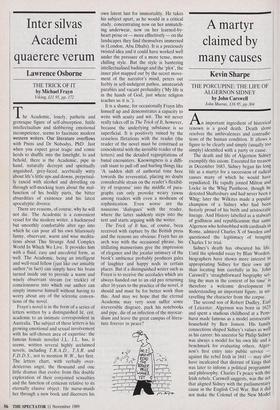Inter silvas Academi quaerere verum
Lawrence Osborne
THE TRICK OF IT by Michael Frayn
Viking, £11.95, pp. 172
The Academic, lonely, pathetic and grotesque figure of self-absorption, futile intellectualism and slobbering emotional incompetence, seems to fascinate modern western writers. Our literature overflows with Pnins and Dr Nobodys, PhD. Just when you expect great tragic and comic herds to shuffle into the limelight, lo and behold, there is the Academic, pipe in hand, naturally decrepit and spiritually anguished, grey-faced, acerbically witty about life's little ups and downs, perpetual- ly rancid with alcohol and drivelling on through self-mocking tears about the mal- function of his bodily parts, the bitter absurdities of existence and his latest apocalyptic divorce.
There are reasons, of course, why he will not die. The Academic is a convenient vessel for the modern writer, a hackneyed but smoothly comfortable alter ego into which he can pour all his own hilariously funny, observant, warm and wise medita- tions about This Strange And Complex World In Which We Live. It provides him with a fluid, easy and anecdotal form, as well. The Academic, being an intelligent and well-read fellow (just like our amiable author,'in fact) can simply have his brain turned inside out to provide a warm and wisely observant stream (or trickle) of consciousness into which our author can simply immerse himself without having to worry about any of the sclerotic conven- tions of the novel.
Frayn's novel is in the form of a series of letters written by a distinguished lit. crit. academic to an intimate correspondent in Australia. The subject of these letters is his growing emotional and sexual involvement with his self-chosen area of expertise: the famous female novelist J.L. J.L. has, it seems, written several highly acclaimed novels, including T.B.A.D., T.S.R. and F. D . D.S . , not to mention W. W., her first. The letters chart, with verbally over- dexterous angst, the thousand and one little dramas that evolve from this double exploration of their conjoined sexualties and the function of criticism relative to its eternally elusive object. He nurse-maids her through a new book and discovers his
own latent lust for immortality. He takes his subject apart, as he would in a critical study, concentrating now on her unmatch- ing underwear, now on her learned-by- heart prose or — more effectively — on the landscapes they find themselves immersed in (London, Abu Dhabi). It is a preciously twisted idea and it could have worked well under the pressure of a more tense, more chilling style. But the style is bantering intellectualised badinage and the 'plot', the inner plot mapped out by the secret move- ment of the narrator's mind, peters out feebly in self-indulgent pathos, amateurish parables and vacant profundity (`My life is in the hands of God, just where religion teaches us it is.').
It is a shame, for occasionally Frayn lifts himself up and demonstrates a capacity to write with acuity and wit. The wit never really takes off in The Trick of It, however, because the underlying substance is so. superficial. It is positively ruined by the ceaseless flirtations with the reader (the reader of the novel must be construed as coincidental with the invisible reader of the letters) and the detailed regurgitations of banal encounters. Knowingness is a diffi- cult stunt to pull off and hurling things, like `A sudden shift of authorial tone here towards the reverential, placing no doubt considerable strain on the reader's flexibil- ity of response' into the middle of para- graphs can only provoke weary yawns among readers with even a modicum of sophistication. Even worse are the nauseous 'dialogues' with the reader, where the latter suddenly steps into the text and starts arguing with the writer.
The Trick of It has, of course, been received with rapture by the British press and the reasons are obvious: Frayn has an arch way with the occasional phrase, his titillating mannerisms give the impression of elegance and the jocular intimacy of the book's ambience probably produces gales of laughter and happy nods in certain places. But if a distinguished writer such as Frayn is to receive the accolades which are always handed out to an old pro returning after 16 years to the practice of the novel, it should and must be for better work than this. And may we hope that the eternal Academic may very soon suffer some irreversible disgrace, pack his notebooks and pipe, die of an infection of the myocar- dium and leave the great campus of litera- ture forever in peace?










































































 Previous page
Previous page